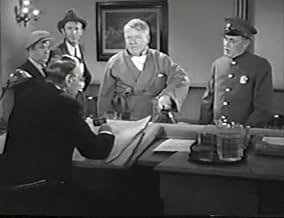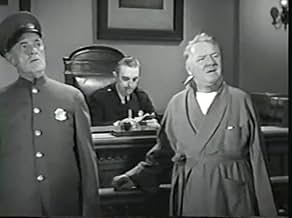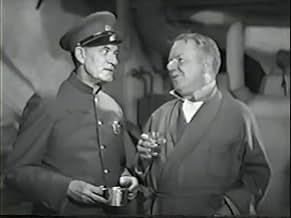AVALIAÇÃO DA IMDb
7,4/10
1,4 mil
SUA AVALIAÇÃO
Adicionar um enredo no seu idiomaHard-working, henpecked Ambrose Wolfinger takes off from work to go to a wrestling match with catastrophic consequences.Hard-working, henpecked Ambrose Wolfinger takes off from work to go to a wrestling match with catastrophic consequences.Hard-working, henpecked Ambrose Wolfinger takes off from work to go to a wrestling match with catastrophic consequences.
- Direção
- Roteiristas
- Artistas
Arthur Aylesworth
- Night Court Judge
- (não creditado)
Jack Baxley
- Court Officer
- (não creditado)
Mickey Bennett
- Office Employee
- (não creditado)
Billy Bletcher
- Timekeeper
- (não creditado)
Harry C. Bradley
- Passing Motorist
- (não creditado)
Avaliações em destaque
This was one of W.C. Fields' favorite films, and in fact was closest to his own family situation, or at least his version of it. It also reprises many of his skits worked out with the writer J.P. McEvoy, which he also replays in It's A Gift and other W.C. Fields' movies of the domestic type, like The Bank Dick.
I love this movie; it contains much of the actual W.C. Fields. The son, Claude, for example. W.C. Fields' and Hattie Fields, his wife, were estranged while their son, William Claude, Jr., grew up. Fields believed, according to biographers, including his grandson, that his wife turned his son against him. He always believed that if he'd had a daughter, she would be a more loyal child. In this movie, the son, Claude, is awful to him, while the daughter, Hope (!), is loyal and loving.
The gags fly: "How can you hurt a person by throwing him on his head?" "It must be hard to lose your mother-in-law." "Yes, it is, almost impossib-, um, yes." Or my favorite exchange, the most brilliantly poignant comment on an unhappy marriage, I think, ever portrayed in a movie. "Is your toast warm, Dad?" "No, dear, it's cold. But it's all right. I've been eating cold toast now for eight years; I like it." All the while looking as miserable as anyone ever could. God, he was brilliant.
There's also the sense that Ambrose, the character The Great Silly plays, is someone lost in a world that he doesn't understand. The scene where instead of the burglars, HE is the one sent to jail. Or the scene where he's parked in a no parking zone, and the painful exchanges with the cop, the chauffeur, etc. Or when he loses the car's wheel and chases it down the hill, over the dale, down the railroad tracks, barely escaping death twice.
His actual mistress (W.C. and Hattie, Catholics, never divorced), Carlotta Monti, plays his secretary, and is the one who explains that her mother is good friends with Hookalakah Meshobbab, somehow without howling with laughter.
Ah, what a film, and it's a disgrace that it's not on DVD yet.
I love this movie; it contains much of the actual W.C. Fields. The son, Claude, for example. W.C. Fields' and Hattie Fields, his wife, were estranged while their son, William Claude, Jr., grew up. Fields believed, according to biographers, including his grandson, that his wife turned his son against him. He always believed that if he'd had a daughter, she would be a more loyal child. In this movie, the son, Claude, is awful to him, while the daughter, Hope (!), is loyal and loving.
The gags fly: "How can you hurt a person by throwing him on his head?" "It must be hard to lose your mother-in-law." "Yes, it is, almost impossib-, um, yes." Or my favorite exchange, the most brilliantly poignant comment on an unhappy marriage, I think, ever portrayed in a movie. "Is your toast warm, Dad?" "No, dear, it's cold. But it's all right. I've been eating cold toast now for eight years; I like it." All the while looking as miserable as anyone ever could. God, he was brilliant.
There's also the sense that Ambrose, the character The Great Silly plays, is someone lost in a world that he doesn't understand. The scene where instead of the burglars, HE is the one sent to jail. Or the scene where he's parked in a no parking zone, and the painful exchanges with the cop, the chauffeur, etc. Or when he loses the car's wheel and chases it down the hill, over the dale, down the railroad tracks, barely escaping death twice.
His actual mistress (W.C. and Hattie, Catholics, never divorced), Carlotta Monti, plays his secretary, and is the one who explains that her mother is good friends with Hookalakah Meshobbab, somehow without howling with laughter.
Ah, what a film, and it's a disgrace that it's not on DVD yet.
Something's amiss if I'm posting the first and only comment on this important Fields comedy, and I think I know what it is: none of his mid-30s Paramount triumphs are available for viewing! Videotapes of Fields films ca. 1932-6 are seemingly nonexistent, and they're never on television (cah-mon, Turner Classic Movies, look alive here!) End result: many thousands of younger viewers -some of 'em already fans of 30s movies- are being cheated of their comedy birthright. (Of course, his later and equally-funny Universal jobs are readily available - witness the ever-spiraling reputation of THE BANK DICK, for starters.) And you can sing THE BANK DICK's praises morning, noon and night and get nothing but 'amens' from me, but a case can be made for mid-30s Fields-at-Paramount as his best and most fertile period, and TRAPEZE -which came at the end of that run- embodies every virtue inherent in the Great Man's work. When a Fields movie fires on all cylinders, it should almost seem a throwaway: meandering plot, disconnected bits of old vaudeville, sitcom surrealism and Falstaffian braggadocio loosely strung together with a nonchalant mean streak adding the sting in the tail. (Certainly, every fan of FAWLTY TOWERS needs to see this one!) Here, he plays Ambrose Wolfinger, a man as put-upon and abused in his fruitless search for middle-class contentment as BRINGING UP FATHER's Jiggs (complete with his very own harridan Maggie, played here by Kathleen Howard, whose baleful countenance could've cowed Groucho into meek silence!) The plot revolves around Fields' doomed attempts to sneak away from work to see his favorite wrestler, the aforementioned Mr. Mishabob, with neither his boss nor his wife ever being the wiser. That's it; that's the plot, thin enough to be rejected for an episode of LIFE OF RILEY. And as usual with Fields, this ludicrously threadbare conflict is the essence of his art, as we watch this browbeaten fellow struggle to maintain a sense of decorum as everyone and everything in his universe conspires to crush, defeat and deny him this one simple desire, with hilarious results. (Well, I told you about that mean streak, right?) The beauty of Fields and TRAPEZE is that, though he's essentially a small, petty, unlikable prig, everyone AROUND him is a thousand times worse - so horrid and poisonous that he becomes sympathetic and even heroic by comparison (with the exception of the one pearl of sentiment he allowed himself, the loving and understanding daughter who defends him by allowing him to think she needs HIS protection). There aren't very many comedies that deliver such richness of pleasure from such skeletal premises: in fact, most of them were made by Fields. Will someone please revive this gem before the last print falls to dust?
Comedy is funny. I mean that it is odd in addition to being amusing. You can laugh and also wonder about why and maybe even laugh at that.
Film comedy is different than other comedy, say written comedy.
My own notions of film are that everything essential was worked out in the thirties when competing concepts elbowed each other and we ended up with the rough cinematic vocabulary we have now. Nowhere is this more true than with straight humor.
Since that time, we've developed a complex notion of the humors of irony, but what I'm talking about here is people directly depicting funny stuff.
So when you go back, you find a few innovators, something like the few jazz inventors of the 50s. What they did is pure by retrospective definition. Going back helps you discover yourself: are you a Keaton man? Chaplin, Arbuckle, Marx, Laurel?
W C Fields is one that you should experience. I liked his "Sucker" movie the best because it was his last and most mature; and the story dealt with him as Fields and the studios telling him he wasn't funny.
Here is his best early film where he does his thing. It is in the vaudeville tradition of being a bunch of loosely connected skits. But it is highly cinematic humor, just not the sight gags you see with the others. It depends all on timing.
The first sequence is the best. Our man is preparing for bed. He sneaks drinks while his witchy wife complains (in a separate bed, as this is post-code). The key joke here is him taking his socks off.
If you haven't seen it, I know this sounds odd, but Fields taking his socks off is hilarious. It takes forever. Then they hear intruders below and he puts his socks back on, taking almost as long. It is a truly precious lesson in investing in laughter. It isn't explosive. It isn't particularly subtle or clever. It is just reality bent in a complex rubato that we have to take the time to relish.
Terrific. I watched that one scene several times.
Ted's Evaluation -- 3 of 3: Worth watching.
Film comedy is different than other comedy, say written comedy.
My own notions of film are that everything essential was worked out in the thirties when competing concepts elbowed each other and we ended up with the rough cinematic vocabulary we have now. Nowhere is this more true than with straight humor.
Since that time, we've developed a complex notion of the humors of irony, but what I'm talking about here is people directly depicting funny stuff.
So when you go back, you find a few innovators, something like the few jazz inventors of the 50s. What they did is pure by retrospective definition. Going back helps you discover yourself: are you a Keaton man? Chaplin, Arbuckle, Marx, Laurel?
W C Fields is one that you should experience. I liked his "Sucker" movie the best because it was his last and most mature; and the story dealt with him as Fields and the studios telling him he wasn't funny.
Here is his best early film where he does his thing. It is in the vaudeville tradition of being a bunch of loosely connected skits. But it is highly cinematic humor, just not the sight gags you see with the others. It depends all on timing.
The first sequence is the best. Our man is preparing for bed. He sneaks drinks while his witchy wife complains (in a separate bed, as this is post-code). The key joke here is him taking his socks off.
If you haven't seen it, I know this sounds odd, but Fields taking his socks off is hilarious. It takes forever. Then they hear intruders below and he puts his socks back on, taking almost as long. It is a truly precious lesson in investing in laughter. It isn't explosive. It isn't particularly subtle or clever. It is just reality bent in a complex rubato that we have to take the time to relish.
Terrific. I watched that one scene several times.
Ted's Evaluation -- 3 of 3: Worth watching.
10Tom-274
Burglars singing in the cellar scene is hysterical. "What are they singing?" Fields asked his distraught wife. The breakfast scene where his wife reads poetry while Fields finds nothing to eat. "And best of all," she declares, "it has no punctuation." Fields in jail with a killer. "I had three wives, and this is the first one I've ever killed." "That's very much in your favor," notes Fields. This film is wonderful. It is a shame it's not available on video.
Ambrose Wolfinger, memory expert & severely henpecked husband, sometimes feels like he's going to lose his grasp on life and fall into very deep trouble - kind of like that old MAN ON THE FLYING TRAPEZE.
W.C. Fields was at a lofty point in his career when he appeared in this hilarious little comedy. The second highest paid star at Paramount - only Mae West received more - he had just returned from MGM where he was featured as Wilkins Micawber in the all-star version of DAVID COPPERFIELD. Ill health would soon begin to stalk him again as a result of his dipsomania, but here he was wonderfully whimsical, whether dealing with spiteful in-laws, bullying traffic cops or bungling burglars in the cellar. With a handful of performances like this, Fields was to take permanent possession of a unique place in American film history.
Playing the two she-dragons Fields must face & fight are Kathleen Howard as his wife, and elderly Vera Lewis as her mother. Both excellent actresses, their scenes are waspish & wickedly funny and it is easy to see how together they could drive a normal male to distraction. It is unfortunate that these two skilled ladies are now nearly forgotten.
Grady Sutton is well cast as Fields' indolent, pouting brother-in-law; his comeuppance is richly deserved. That's Walter Brennan & Tammany Young as the crooning crooks who find themselves far from the banks of the Wabash.
It is interesting to note that the two women in the film who vigorously defend Fields also had close relationships with him outside the Studio. Mary Brian, as his daughter, was a longtime friend & neighbor of Fields. They had appeared together in the silent version of the story - RUNNING WILD - and Fields insisted on her inclusion in the talkie remake. Carlotta Monti, as Fields' faithful secretary, was also his longtime mistress. A part of his life for many years, she was at his side when he died on Christmas Day, 1946.
W.C. Fields was at a lofty point in his career when he appeared in this hilarious little comedy. The second highest paid star at Paramount - only Mae West received more - he had just returned from MGM where he was featured as Wilkins Micawber in the all-star version of DAVID COPPERFIELD. Ill health would soon begin to stalk him again as a result of his dipsomania, but here he was wonderfully whimsical, whether dealing with spiteful in-laws, bullying traffic cops or bungling burglars in the cellar. With a handful of performances like this, Fields was to take permanent possession of a unique place in American film history.
Playing the two she-dragons Fields must face & fight are Kathleen Howard as his wife, and elderly Vera Lewis as her mother. Both excellent actresses, their scenes are waspish & wickedly funny and it is easy to see how together they could drive a normal male to distraction. It is unfortunate that these two skilled ladies are now nearly forgotten.
Grady Sutton is well cast as Fields' indolent, pouting brother-in-law; his comeuppance is richly deserved. That's Walter Brennan & Tammany Young as the crooning crooks who find themselves far from the banks of the Wabash.
It is interesting to note that the two women in the film who vigorously defend Fields also had close relationships with him outside the Studio. Mary Brian, as his daughter, was a longtime friend & neighbor of Fields. They had appeared together in the silent version of the story - RUNNING WILD - and Fields insisted on her inclusion in the talkie remake. Carlotta Monti, as Fields' faithful secretary, was also his longtime mistress. A part of his life for many years, she was at his side when he died on Christmas Day, 1946.
Você sabia?
- CuriosidadesThis was the last film directed by Clyde Bruckman. Although Bruckman's name appears on the credit, this film was actually directed by W.C. Fields, who took over after Bruckman had to quit early in the shoot due to the effects of his alcoholism. This is the only film on which Fields technically worked as his own director.
- Erros de gravaçãoMother-in-law Cordelia says "Well he's a fiend, a wool in sheep's clothing" ... Leona Wolfinger immediately catching the error says "What?" and immediately Cordelia corrects herself "A wolf in sheep's clothing ..." and the scene continues as if no error occurs; a great recovery.
- Citações
Ambrose Wolfinger: My poor mother-in-law died three days ago. I'm attending her funeral this afternoon.
Ambrose's Secretary: Isn't that terrible, Mr. Wolfinger!
Ambrose Wolfinger: Yes, it's terrible. It's awful. Horrible tragedy.
Ambrose's Secretary: It must be hard to lose your mother-in-law.
Ambrose Wolfinger: Yes it is, very hard. It's almost impossible.
- ConexõesFeatured in W.C. Fields: Straight Up (1986)
- Trilhas sonorasOn the Banks of the Wabash, Far Away
(1897) (uncredited)
Music and lyrics by Paul Dresser
Sung a cappella by W.C. Fields, Walter Brennan, Tammany Young and Lew Kelly
Principais escolhas
Faça login para avaliar e ver a lista de recomendações personalizadas
- How long is Man on the Flying Trapeze?Fornecido pela Alexa
Detalhes
- Data de lançamento
- País de origem
- Idioma
- Também conhecido como
- Everything Happens at Once
- Locações de filme
- Empresa de produção
- Consulte mais créditos da empresa na IMDbPro
- Tempo de duração
- 1 h 6 min(66 min)
- Cor
- Proporção
- 1.37 : 1
Contribua para esta página
Sugerir uma alteração ou adicionar conteúdo ausente
























